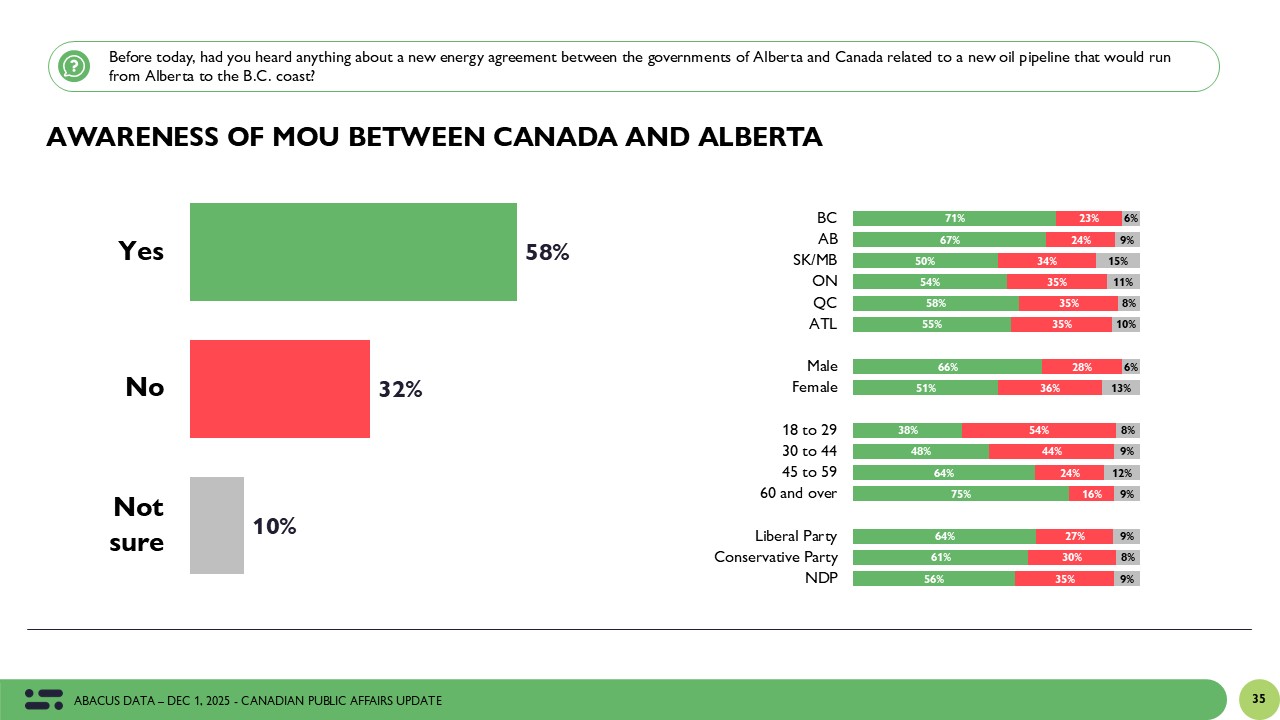The Politics of Safety: Why Bail Reform Is Striking a Chord with Canadians
October 3, 2025
Note: This survey was conducted from September 12 to 17, 2025, and was originally planned for earlier release. The results predate the Conservative Party’s October 2 announcement of their “Scrap Liberal Bail” platform, and while not connected to that release, they provide important context for understanding Canadians’ perceptions of crime and public safety.
Crime and public safety have quickly become key elements in Canada’s political conversation as Parliament resumes. While the country is not facing a crime wave on the scale of past decades, many Canadians feel less secure today than even a year ago. Concerns about drug use, property crime, and violent offences sit alongside frustrations with homelessness, addiction, and the cost of living – creating a climate where both social breakdown and weak enforcement are seen as driving the problem.
This unease has sharpened the political debate. Pierre Poilievre and the Conservatives have made bail reform and tougher sentencing a rallying cry, arguing Canada’s justice system is too lenient. Mark Carney and the Liberals, meanwhile, must show they can balance enforcement with compassion – tackling root causes while addressing immediate safety concerns.
These findings reveal not only how Canadians view crime in their communities, but also why the issue could become a defining fault line in federal politics – one where enforcement and prevention both matter, but the balance is hotly contested.
Rising Concerns About Crime
Canadians are increasingly uneasy about the state of crime and public safety. Four in ten (44%) say crime in Canada has gotten worse over the past year, compared with just 18% who believe it has improved. Age plays a significant role in these perceptions: younger Canadians are more optimistic, with 35% of those aged 18–29 and 23% of those aged 30–44 saying crime has gotten better. Older Canadians, however, are far more pessimistic – 51% of both those aged 45+ believe the situation has worsened.
Partisan leanings also shape attitudes. Conservative supporters are much more likely to say crime has gotten worse (61%), compared to only 30% of Liberal supporters.


What Canadians See as the Biggest Crime Issues
When Canadians talk about crime in their communities, no single issue dominates. Instead, they point to a mix of concerns: drug-related offences (37%), property crime (34%), violent crime (31%), break-ins (30%), and vehicle theft (30%). Regional realities shape these perceptions – British Columbians are most likely to cite drug-related offences (52%), Saskatchewan and Manitoba residents point to property crime (55%), while in Ontario break-ins (37%) and vehicle theft (36%) stand out. Quebecers, meanwhile, are far more likely to cite cybercrime (49%) and organized crime (29%).
These patterns highlight why crime cannot be addressed with a one-size-fits-all solution. Canadians’ lived experiences of crime are shaped by where they live, meaning national policy must also account for deeply local challenges.

What’s Driving Rising Crime?
For many Canadians, the causes of rising crime go well beyond policing. Nearly half (48%) point to homelessness and addiction as key drivers, while 42% blame weak sentencing and justice system policies. Another 39% cite broader economic pressures like the rising cost of living. Conservative supporters are especially likely to focus on sentencing and government inaction, while Liberals are less inclined to see those factors at play.
This highlights that Canadians see crime as both a social and a systemic issue. It is not only about punishment and enforcement – it is also about economic conditions, housing, and addiction. Addressing crime, therefore, means tackling the root causes as much as the symptoms.

Confidence in Government to Address Crime
Overall, Canadians are more doubtful than confident in the federal government’s ability to address crime and public safety – two in five (41%) say they lack confidence, while 29% express confidence. Younger Canadians are more optimistic, with 40% of those 18–29 saying they are confident, compared to just 21% of those aged 45–59 and 25% of those 60+.
Partisan divides are clear: 44% of Liberal supporters are confident in the government’s ability to address crime, while 61% of Conservatives say they are not.


A Divided Approach: Tougher Laws vs. Social Supports
Canadians believe reducing crime requires a balanced approach – one that addresses both enforcement and root causes. Over half (52%) want stricter laws and penalties for certain crimes, while 40% favour improving social services to address underlying causes. Another 38% emphasize enhancing mental health and addiction supports. Beyond these, many also believe in increasing funding for law enforcement (32%) and investing in community programs and prevention initiatives (28%).
Demographic divides are notable. Older Canadians are more likely to call for tougher laws (70% of those 60+) and more police funding (39%). Women lean more toward strengthening social services (44%) and improving mental health and addiction supports (45%). Politically, Conservatives prioritize stricter laws and more police funding, Liberals focus on social services, and NDP supporters highlight mental health and addiction supports.
This balance underscores the complexity of the public mood. Canadians want immediate safety through enforcement but also recognize the need to invest in long-term solutions that address why crime happens in the first place.


The Bail Reform Debate
One of the clearest points of consensus is the widespread belief that Canada’s bail system is too lenient. Nearly eight in ten Canadians (79%) say it is too easy for people accused of serious crimes to be released. Support for reform crosses partisan lines: 83% of Conservatives and 76% of Liberals agree. Most Canadians (80%) also believe repeat violent offenders should automatically be denied bail for serious charges.
This consensus is politically powerful. It explains why Conservative leader Pierre Poilievre has made bail reform a central plank of his law-and-order message. His calls for tougher bail laws tap into frustration that extends far beyond his base – even into Liberal ranks. With few issues showing such broad agreement, bail reform could become a defining flashpoint in the national conversation on public safety.


Policing vs. Prevention
Canadians are divided on how best to ensure long-term safety. Over half (54%) say police funding should be increased, with Conservatives most supportive (63%) but even half of Liberals agreeing. When asked what would most reduce violent crime in the long run, 62% chose stricter bail rules and more enforcement, while 38% pointed to investments in social services, mental health, and prevention. Older Canadians are far more likely to favour enforcement, while younger Canadians are evenly split.
The generational divide here is telling: younger Canadians are open to preventative approaches, while older Canadians prioritize immediate enforcement. This signals a long-term debate about whether Canada should double down on policing or invest more in root causes – a divide that will likely shape the future of public safety policy.


THE UPSHOT
The story these results tell is one of both division and consensus. Canadians are deeply concerned about crime, but they don’t see it through a single lens. For some, it is about social breakdown – addiction, homelessness, and the cost of living. For others, it is about weakness in the justice system and the failure of government to enforce laws. This duality means any political party trying to own the issue has to balance two competing instincts: the demand for tougher enforcement and the recognition that prevention and supports matter too.
For Pierre Poilievre and the Conservatives, the environment is advantageous. Concerns about rising crime and the strong consensus that bail is too lenient give weight to his law-and-order message. Bail reform, in particular, offers a rare point of agreement across partisan lines, allowing him to reach beyond his base with a clear, simple promise to “fix the system.”
For Mark Carney and the Liberals, the challenge is to avoid being boxed in as soft on crime. Their strength lies in addressing root causes, but Canadians also want tougher rules. To compete, Liberals must frame their approach as one of balance – coupling investments in social supports with measures that reassure the public on enforcement.
The political impact is clear: crime and public safety have become a stage where the Conservatives can score easy points, but the Liberals are not without tools. Canadians want balance, and the party that convinces voters it can deliver both accountability and prevention is likely to win the debate.

METHODOLOGY
The survey was conducted with 2,230 Canadian adults from September 12 to 17, 2025. A random sample of panelists were invited to complete the survey from a set of partner panels based on the Lucid exchange platform. These partners are typically double opt-in survey panels, blended to manage out potential skews in the data from a single source.
The margin of error for a comparable probability-based random sample of the same size is +/- 2.08%, 19 times out of 20.
The data were weighted according to census data to ensure that the sample matched Canada’s population according to age, gender, educational attainment, and region.
This survey was paid for by Abacus Data.
Abacus Data follows the CRIC Public Opinion Research Standards and Disclosure Requirements that can be found here: https://canadianresearchinsightscouncil.ca/standards/
ABOUT ABACUS DATA
We are Canada’s most sought-after, influential, and impactful polling and market research firm. We are hired by many of North America’s most respected and influential brands and organizations.
We use the latest technology, sound science, and deep experience to generate top-flight research-based advice to our clients. We offer global research capacity with a strong focus on customer service, attention to detail, and exceptional value.
And we are growing throughout all parts of Canada and the United States and have capacity for new clients who want high quality research insights with enlightened hospitality.
Our record speaks for itself: we were one of the most accurate pollsters conducting research during the 2025 Canadian election following up on our outstanding record in the 2021, 2019, 2015, and 2011 federal elections.
Contact us with any questions.
Find out more about how we can help your organization by downloading our corporate profile and service offering.




